Warframe is now available on mobile.
The popular multiplayer third-person shooter game from London, Ontario-based Digital Extremes has launched on iOS, with an Android release in the works. It’s a notable expansion for Warframe, which has been going strong for over 10 years now on consoles and PC.
To learn more about the mobile version of Warframe, MobileSyrup sat down with Digital Extremes’ Rebecca Ford, creative director on Warframe, and Finland-based Nitro Games’ Jussi Elonen, product lead on Warframe Mobile. The pair discussed their cross-studio collaboration, the challenges of translating the Warframe experience to mobile, the cultural similarities between Canada and Finland and more.
Question: Warframe has been around for nearly 11 years now. Why was it important to branch out to mobile?
Rebecca Ford: When the tech allows us to have Warframe in more places, we would be fools not to bargain with the tech and make it work. It’s a free-to-play game, so we only ever find ourselves better off by spreading it around via the platforms where people can play Warframe. We love inviting platforms to take a look at whatever it is we’re cooking, so our strange little sci-fi free-to-play game continues to live on, so mobile was the next logical [step] from a business sense, but also just from a community sense as well to get more people in.
Q: How did the partnership between your teams come about and how did that collaboration look, especially since Digital Extremes is in Canada and Nitro Games is in Finland?
Ford: I think from one point of view, we wanted it to be on mobile before we knew we needed expertise. So we have a great internal team that is technically ready and has been working on porting and adapting our engine and everything Warframe to the mobile platform. But things last year really started with Nitro. And I can say for sure the expertise of user-friendliness and just mobile platform expertise is where things have really turned around in terms of the game itself feeling like it was meant to be played on mobile. But I’ll let Jussi speak to that a bit more as well.
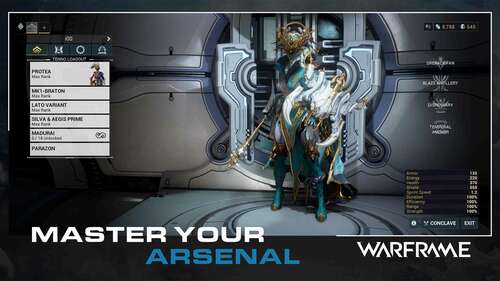 Jussi Elonen: Pretty much what Rebecca said. You guys have an amazing team over there and the way that we work together is as one team. So we work really closely; we don’t have separate teams on Nitro and DE and we collaborate on a daily basis. But like you said, Rebecca, we do have a mobile background at Nitro. Obviously, we’ve done other stuff as well in the past, but we also have a lot of people on the team who have both mobile and PC and console expertise and cross-play understanding. And in that way, we could bring out a lot of expertise and know-how to the table, especially on the UI and UX side. How can we bring a game like Warframe to mobile? And obviously, that’s the biggest challenge, and I believe that we’ve done a pretty good job. And I’m hoping you’re going to download the game [on February 20th] and come to the same conclusion.
Jussi Elonen: Pretty much what Rebecca said. You guys have an amazing team over there and the way that we work together is as one team. So we work really closely; we don’t have separate teams on Nitro and DE and we collaborate on a daily basis. But like you said, Rebecca, we do have a mobile background at Nitro. Obviously, we’ve done other stuff as well in the past, but we also have a lot of people on the team who have both mobile and PC and console expertise and cross-play understanding. And in that way, we could bring out a lot of expertise and know-how to the table, especially on the UI and UX side. How can we bring a game like Warframe to mobile? And obviously, that’s the biggest challenge, and I believe that we’ve done a pretty good job. And I’m hoping you’re going to download the game [on February 20th] and come to the same conclusion.
Q: How did you approach adapting the game to a smaller device like mobile? Was the focus more on translating the experience fully or giving more of a mobile-optimized version of it? How did you handle all of that?
Elonen: The idea from the beginning was that all content should be labelled on mobile so we don’t have any mobile-specific content or anything that’s restricted from PC or console. So for us, that meant that we needed to really understand how people play the game. There is the unique playstyle, that parkour-style movement, and that is something that we really locked our focus on — the core gameplay experience, how do you move in the game? How can you perform the stunts, the parkour moves that you can do on PC and console, and how do we then bring that over to mobile touchscreen and thumbs? Obviously, we used standard stuff, but also quite inventive features to make sure that you can play the game like you can play it on PC.
So we have a lot of automations that help you to play the game as it’s supposed to be played which also don’t give you too much of an advantage on the platform. And obviously, there are a million different tiny little ways to play on mobile, so we are allowing the player to fully customize their hot buttons, move them around, turn on any automation for the shooting and melee… We have a pretty good default setting for the new players who are going to come in but then once people start playing more hardcore, they can they can customize their HUD and they can start using three or four fingers if they so choose. It’s been a challenge, but it’s been a fun challenge.
Q: Warframe is on Nintendo Switch so there’s some precedent for the game on a smaller screen outside of console and PC. But of course, smartphones have their own unique sets of challenges, like how you mentioned optimizing for the touchscreen. What were some of the biggest challenges in bringing Warframe to mobile?
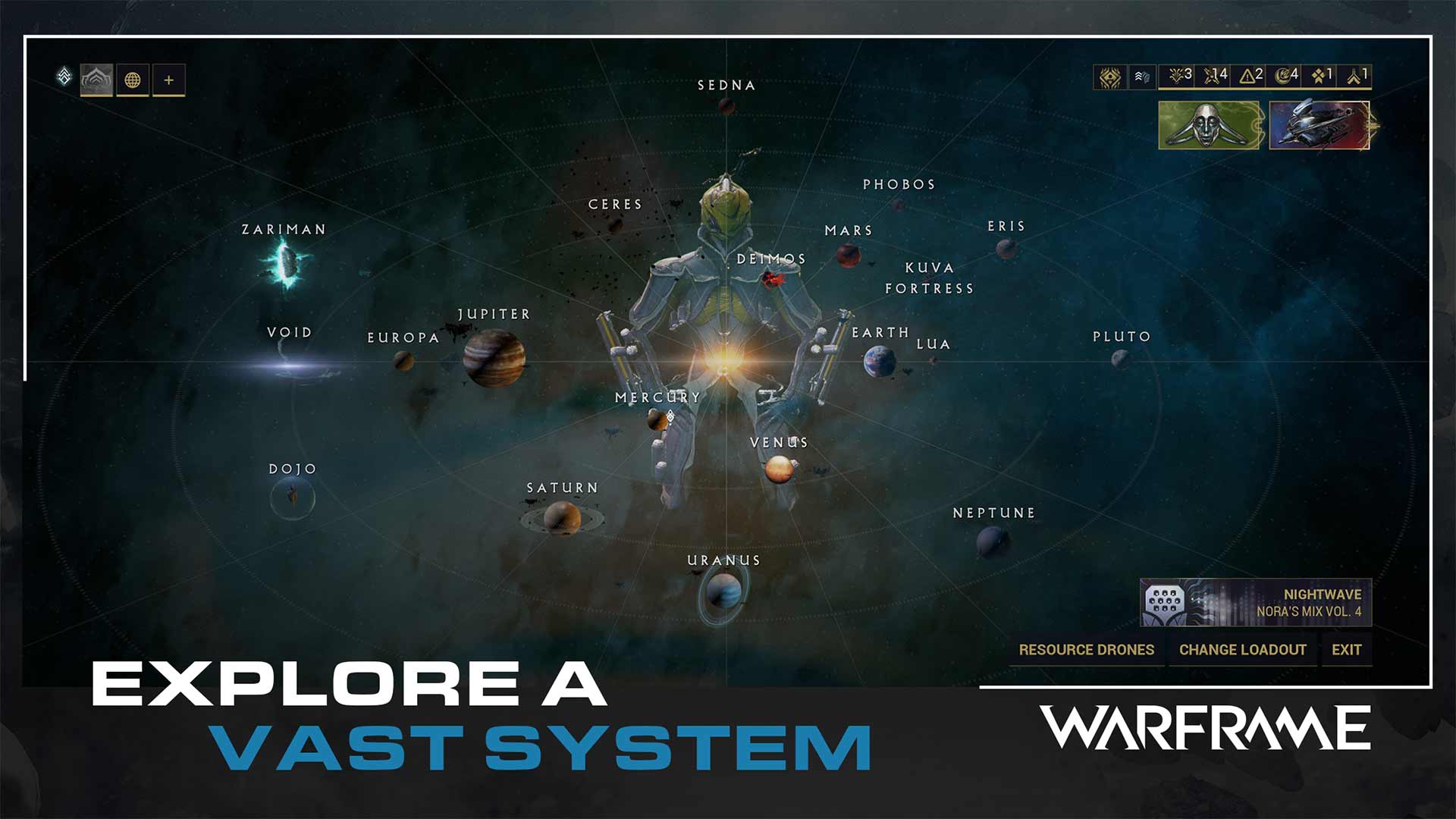 Elonen: For us, like I said, it was movement. How do you make sure that you can move on the screen? And then also, how can you be aware of the environment in the game? So we did move the camera a bit closer, fiddled a bit with the field of view just to make sure that players can actually see what’s around them. We did add an accessibility feature where we have a sensor ring that’s going to pop up every time the character hears any sounds so it shows in red if there’s anything close by and shows a different colour when there are interactable objects around. There are a lot of buttons, obviously, that you can use on PC and console, so we had to come up with contextual buttons so they only show up when they’re needed. So a lot of small design features that we have implemented so the game is user-friendly.
Elonen: For us, like I said, it was movement. How do you make sure that you can move on the screen? And then also, how can you be aware of the environment in the game? So we did move the camera a bit closer, fiddled a bit with the field of view just to make sure that players can actually see what’s around them. We did add an accessibility feature where we have a sensor ring that’s going to pop up every time the character hears any sounds so it shows in red if there’s anything close by and shows a different colour when there are interactable objects around. There are a lot of buttons, obviously, that you can use on PC and console, so we had to come up with contextual buttons so they only show up when they’re needed. So a lot of small design features that we have implemented so the game is user-friendly.
Rebecca — anything you want to add?
Ford: I think there’s just the actual practical things that Jussi mentioned will make the platform stand on its own. And then we also wanted to make sure that cross-platform save was live so a person could hop from their veteran account to mobile back to the veteran account and progress is shared. That’s a core part of the appeal of mobile to veteran players. And then the other thing is for new players hopping in seeing Warframe for the first time, over the past year or two, we’ve tried to optimize that new player experience with the opposite of ‘Death by 1000 cuts.’ It’s like ‘Life by 1000 BandAids.’ But just making sure that when we do launch [on February 20th], we have the new player experience at this level and then every update, we’re just going to slowly be bumping it up and up and up so that it’s as good as it can be for that day one experience.
Q: Jussi, what’s it like coming onto something as popular as Warframe and helping DE bring it to mobile?
Elonen: It’s been fun. One of the core things that I believe is why we have been so successful in porting was because of the IP. The whole team has been so excited to work on this — everybody knows Warframe. And it just gives everyone a sort of motivation boost to do their best; they want to see the players enjoy the game. So for me, as the guy leading the group, it’s been really easy because everybody has really, really motivated to do their best. Obviously, it’s a huge opportunity to work with Warframe and Digital Extremes.
Q: Rebecca, Warframe has been around for so long now, so over this time, how have you balanced pushing the engine and technology forward while supporting older devices, and how does mobile now factor into that strategy?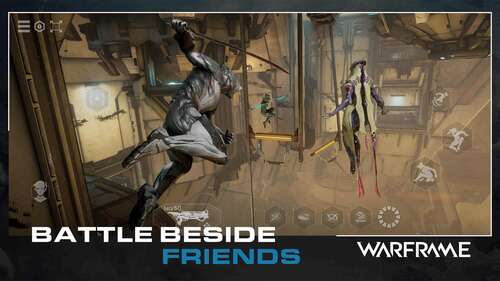
Ford: We used to stagger releases. Back in 2019, even, PC would get the update, and then console would get it a month later, perhaps. So we have a new normal, which is we deploy an update, and we deploy it on all platforms to support cross-play and cross-platform save. So the philosophy is it’s a unified experience. If you look at the timeline of Warframe, that’s been newer for us. Like, we had seven years of no unification, and now we have about three years-ish of unification. So it’s on the newer end of how we operate.
But for me, I think it’s better for the community because one of the most heartbreaking things about working on Warframe pre-unification was spoilers, and if we dropped a quest like [the 2021 expansion] The New War and PC got it first, the entire console player base would have been waiting and spoiled. And I have felt from a community perspective and even a business perspective, it’s important that you’re giving everyone the same experience at the same time so that you and your friends in our co-op game are talking about the same things and relating to each other on the same thing. So we intend to support the mobile community as much as we have Switch and everything now that we’re fully unified. So that’s where we’re at.
Q: That brings up a great point — you’re now supporting so many systems at the same time. So, what have been some of the challenges in pivoting to that, especially since you said for a long time that you weren’t at that stage?
Ford: It is still a challenge. I have seven years of bad habits, which is ‘you can fix anything in the next hotfix right away without having to worry.’ On the one hand, that made you more cavalier because you could deploy a fix whenever you wanted. So now, it’s a matter of discipline, it’s a matter of scheduling, it’s a matter of community expectation. And these are a very gradual things to roll out for us — the player understanding that you can anticipate our next updates better now. But at the same time, we have to be more cautious. So the the Wild West has sort of been repopulated with some structure level that allows us to get more predictable with our updates, but also be more organized.
So it’s different. It’s good. It’s bad, depending on what exactly we’re struggling with at a given time for a live service game. Because really, the mentality we’ve had with operating our life service game is ‘always be changing and updating.’ But now it’s more like with a caveat of ‘always be changing and updating on a schedule,’ which is fine. Some people are used to the old ways, and now we have new ways.
Q: I had a colleague who wanted me to ask: Canadians are known for a few things, so will there ever be a Warframe suit whose power is to apologize?
Ford: [laughs] Harrow is kind of penitent — he has a skill called penance so he’s more about self-flagellation if you can quote that in an interview. [laughs] But no plans for an apology-based Warframe yet, and sorry about that!
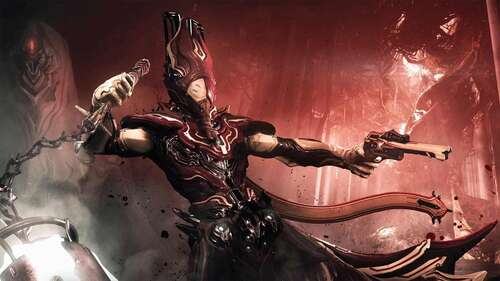
Harrow.
Elonen: I just have to say that if there were, it would also have to be for the Finnish. [laughs]
Ford: Yeah, it’s crazy, the cultural crossover between the Finns and the Canadians! It has been so fun working with and meeting the Nitro team.
Q: [laughs] I’m curious. Can you expound on that? What do you mean by the cultural crossover?
Ford: Well, I won’t talk about the beer! [laughs] But I think the best example is we were lucky enough to bring Nitro to the studio, not only like a month ago, and the first itinerary item was what NHL game can we go to? Because everyone is such a hockey fan. So part of the agenda was let’s make sure we go see the Leafs game — that’s where it starts. And then from there, just having a great time talking about our fascination with certain games and little cultural things.
Q: On the subject of Canada, Warframe is one of gaming’s biggest Canadian success stories, so I’m curious for your take on this. I wrote a column a few weeks ago about how the massive Canadian gaming industry needs more recognition. It blew up and I got many messages from developers, which was nice to see. My point in bringing that up is it clearly resonated with a lot of people. From your point of view, on a grander level, what can be done — on the studio side, media side, government side, etc — to uplift Canadian games?
Ford: Oh, that is a great question. I have this very alienating sense of — I think there are a lot of great Canadian game developers, but in London, I’ve always felt so isolated. We have about three or four-ish major studios, but when I see people in Vancouver or Quebec, Montreal, I just always think, ‘Oh, we’re not even in the dev hotspot.’ But Canada isn’t the hotspot, right? It’s the U.S. or these other countries. We have peers in New Zealand that also feel similarly — that they’re super isolated because they’re not where all the action is.
But from a Canadian perspective point of view, specifically, it’s interesting because we have great schooling that can set people up for success in the games industry. I know there are some tax benefits as well from the business side which I don’t know too much about so I can’t speak to it. But there’s a lot to celebrate with Canadian tech and Canadian developments. What more could be done? It’s hard to say with the way the industry is looking right now, especially with the published games model seemingly trying to find its footing, the live service model either being the beast in the room or not. The industry itself needs more done to support it, so for Canada to be just a microcosm of it? There are a lot of great things happening here and I don’t know any solutions to make it better.
And even something like TennoCon that DE puts on in London, rather than elsewhere, like in America, can help with that. My next question is for both of you: mobile will obviously open up Warframe to many more players. What advice would you give to newcomers?
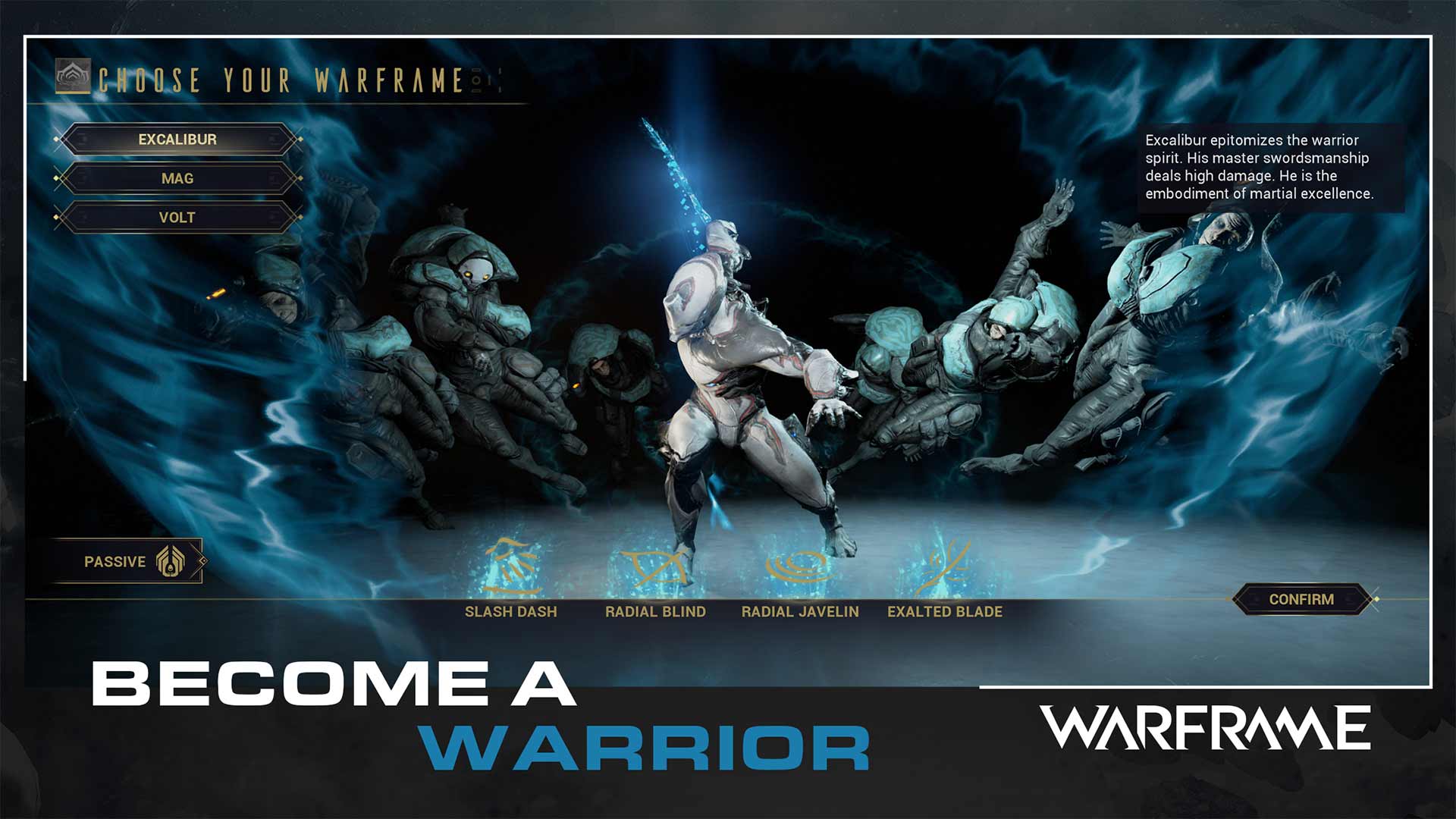 Ford: My tip is to just play at your own pace. The game will never punish you for taking breaks, and the game will never punish you for needing time to understand the systems. Play at your own pace. There’s no wrong way to play Warframe. Welcome to the community.
Ford: My tip is to just play at your own pace. The game will never punish you for taking breaks, and the game will never punish you for needing time to understand the systems. Play at your own pace. There’s no wrong way to play Warframe. Welcome to the community.
Elonen: I have to agree — just play the game and enjoy it. Don’t think about it too much. Just have fun.
Ford: Yeah, it’s a comfort game. It’s meant to be either brain-on or brain-off, however you want to approach it, it’ll be there for you. You can mindlessly grind or you can really build meta-intensive, and there’s a way to play for everyone.
Q: What are you most excited for players to experience with Warzone on mobile?
Ford: For me, it’s never missing a Baro [an in-game trader who appears every two weeks] again because I’m traveling. So I can always just log in on the Baro weekends from my phone and grab whatever he’s bringing, which is a huge quality-of-life improvement for me as a veteran.
Elonen: I’ve played on PC and lately I’ve been playing quite a lot on mobile, obviously on my work time. But I also enjoy playing it quite a lot in my free time. So I believe that it’s really good to play on mobile and I’m really hoping to hear the same sort of feedback from the community — that they just enjoy it on mobile. I’m looking forward to that.
This interview has been edited for language and clarity.
Warframe can be downloaded for free on PlayStation 4/5, Xbox One, Xbox Series X/S, PC, Nintendo Switch and iOS.
Image credit: Digital Extremes

